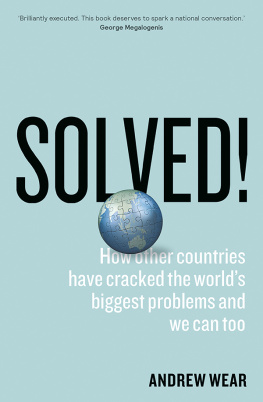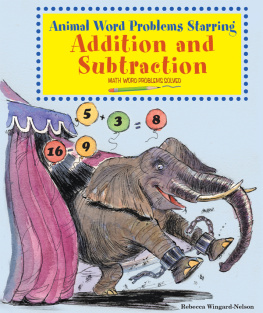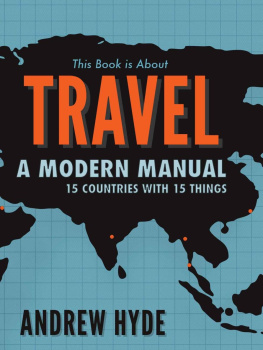PRAISE FOR SOLVED!
A refreshing, cup-half-full approach to inspire each and all of us that we must and can do the hard work to make the world a better place. Dana H. Born, Harvard Kennedy School of Government
In a world of endless outrage, armchair critics and keyboard warriors, Solved! is that rarest of things: a book that actually offers solutions to the planets problems instead of just listing them. It is only by listening to positive arguments such as these that we will ever stand a chance of fixing the worlds problems. Joe Hildebrand, co-host of Network 10s Studio 10
Andrew Wear offers things valuable and rarely present in a practical book about politics: determined optimism, and real hope. Van Badham, Guardian columnist and social commentator
At a time of mounting public dismay at the inability or unwillingness of our leaders to address the pressing issues of our time, Andrew Wears book is a welcome dose of optimism that we can create change. With the positivity of a self-help guide, Wear takes us around the globe, showing us inspiring examples of progress and success across a number of challenging policy areas, from health to education to climate change. Buy it if you are over gloom and doom and ready for action! Rebecca Huntley, author of Still Lucky and Australia Fair
The times call for realistic and infectiously optimistic leadership people are yearning for stories of hope. Andrew Wears Solved! inspires optimism, hope and a positive strategy to be the best we can be. Victor Perton, founder of the Centre for Optimism
Optimistic, clear, compelling and realistic A well-informed guide to the globes most pressing problems. Andrew Wear has interviewed experts, considered the evidence and developed practical responses to pressing concerns such as global warming, schools performance and urban renewal. This uplifting and timely guide shows how policy and citizens can tackle even the largest challenges. Glyn Davis, distinguished professor at Australian National Universitys Crawford School of Public Policy
Andrew Wear shows why in pessimistic times there are reasons to feel optimistic about our capacity to solve the big problems the world is facing. I know from my work at Apolitical how much appetite there is for visionary solutions broken down into practical steps something for which Wear has a knack. Robyn Scott, co-founder and CEO of Apolitical
In this evidence-based and immensely readable book, Andrew Wear takes us on a global journey of discovery to the places where our most challenging public policy problems have been solved. Combining academic research with personal narrative, Wear offers powerful insights into the ability of municipalities, cities and countries to transform their economic, social and environmental outcomes. He also offers practical steps to help governments do likewise. Anyone interested in designing and implementing public policy that works should read this book. Professor Helen Sullivan, director of Australian National Universitys Crawford School of Public Policy

Published by Black Inc.,
an imprint of Schwartz Books Pty Ltd
Level 1, 221 Drummond Street
Carlton VIC 3053, Australia
www.blackincbooks.com
Copyright Andrew Wear 2020
Andrew Wear asserts his right to be known as the author of this work.
ALL RIGHTS RESERVED.
No part of this publication may be reproduced, stored in a retrieval system, or transmitted in any form by any means electronic, mechanical, photocopying, recording or otherwise without the prior consent of the publishers.
9781760641641 (paperback)
9781743821039 (ebook)
Cover photograph by Shutterstock
Text design and typesetting by Akiko Chan
For Sophie, Genevieve, Charlotte and Alice
INTRODUCTION
If Other Countries Can Do It, Why Cant We?
O n a sunny Saturday, I was browsing my favourite bookshop when I was struck by a sense of gloom. The shelf in front of me was dominated by books that were depressing in their subject matter: our crisis in democracy, the rise of racism and global inequality, the decline of civilisation. I inhaled their sense of panic and malaise almost unconsciously; my previously sanguine mood skirted the aisle and disappeared out the back exit.
The politics section of this bookshop was a dismal place. The titles on display, although likely written with insight and wisdom, focused on the problems our world faces and conjured a bleak and desperate future. Yet just an aisle away, in the self-help and business sections, the books were affirming. They reassured the reader that with the right attitude and an appropriate strategy, change was possible and obstacles could be overcome.
The difference in approach between these categories sat uneasily with me. The world was facing serious challenges, but I knew from my work in public policy that there had been enormous progress in a number of areas, with some countries achieving remarkable results. I was fatigued by doom and gloom. I wondered if I could take the positive perspective of self-help and business books and apply it to the politics section. If I could shed some light on how countries around the world are working to crack the big problems, it might help to illuminate what sort of government and community action is required to make a difference. Readers might take heart from other countries successes and be reassured that we can make real progress towards solving humanitys biggest challenges.
This book is the product of that ambition. I hope that the insights, stories and strategies in these pages inspire you. Because if other countries can do it, so can we.
F or every depressing statistic you hear about, somewhere in the world there is also a story of incredible success. These stories show us that with sufficient will and the right approach, difficult problems can be solved.
For example, fifty years ago the average life expectancy in the United States was among the highest in the world. Americans could expect to live two and a half years longer than those in the rest of the developed world.
In 1990, when climate change first began to be taken seriously, Australias carbon emissions were among the highest in the industrialised world, trumped only by Luxembourg, Estonia and the United States. Subsequently, Australia has torn itself apart with rancorous, highly politicised debates about how to address climate change. The government introduced an emissions trading scheme only to abolish it soon afterwards. Thirty years later, each Australian emits 16 tonnes of greenhouse gas a year, the worst rate in the world, and an increase on 1990 figures.
Another example: in 2000, New Zealand school students were achieving some of the best results in the world. In reading, the country was third globally, behind only Finland and Canada. Yet the reading performance of New Zealand students has deteriorated. In 2018, fifteen-year-olds were reading at a level more than six months behind their predecessors of fifteen years earlier. By contrast, Singapore has built an education system from scratch, which is now delivering world-best results. Within a government-run system that values and invests in teachers, Singaporean students are reading at a level more than a year ahead of the average in many parts of the world, and achieving results in maths more than two years ahead of their counterparts in New Zealand.










